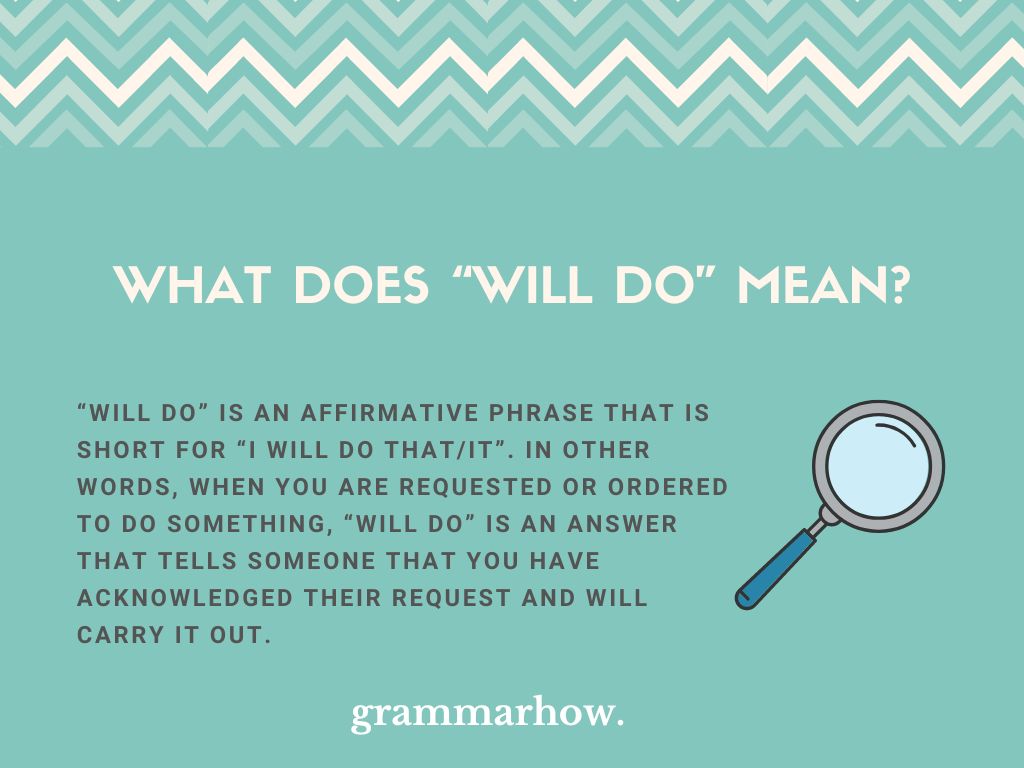If you’ve heard the phrase “will do” before, you may have been a little confused as to what it actually meant.
In this post, we will discuss the meaning of this phrase and how it should be used.
What Does “Will Do” Mean?
“Will do” is an affirmative phrase that is short for “I will do that/it”. In other words, when you are requested or ordered to do something, “will do” is an answer that tells someone that you have acknowledged their request and will carry it out.

English speakers love to shorten things so that talking is more convenient and efficient. The phrase “will do” is that kind of device. It’s just a full length phrase that would sound too formal in modern English being converted into a shorter, more casual way of doing things. Consider the following:
- Matthew, could you grab the report on my desk real quick?
- I will do that, boss.
This response would be the “correct” and most proper form of technical English. But most everyone can admit that it sounds a little off to speak so formally. Instead of such a response, you could simply say:
- Will do, boss.
The meaning is exactly the same; Matthew has acknowledged the request made of him and confirmed with his boss that he will carry out that request. But he did it in less words and in a manner that seems far more casual and natural sounding in modern English.
In any situation where you would say “I will” or “I will do that”, you can say “will do” instead. Just keep in mind that it might not be suitable for all situations, depending on how formal the person you are talking to is.
Is It Correct to Say “Will Do”?
Technically, “will do” is not grammatically correct. After all, it’s not a complete sentence, and the subject has been completely omitted. However, it’s incorrect in the same way that “thank you” is; it’s a shortened version of a grammatically correct phrase that is mostly understood by everyone.
If someone makes a request of you, and you say “will do”, they know that you mean “I will do it”. That’s obvious from the context of the conversation. Because of this, “will do” is acceptable to use when speaking even though it is technically incorrect. There are many such phrases in English.
Will Do or We’ll Do?
One might think that, if “will do” is short for “I will do”, then “we’ll do” would be short for “we will do”. However, this is not the case. The only shorthand phrase for this type of statement is “will do”. That’s because “will do” can carry the implication of multiple people if necessary.
For example, consider the following sentences:
- I need you and Becky to clear off the stage, James.
- Will do, sir.
In this exchange, simply saying “will do” implies that James will get Becky and together they will do what has been asked of them. This means that “will do” can cover both “I will do” and “we will do”. This is also why “we’ll do” is incorrect and not used.
Is It Rude to Say “Will Do”?
“Will do” is not necessarily rude in and of itself. However, it depends on who you are speaking to. If you are speaking to someone that has no issue with casual and informal speech, then “will do” would not be considered rude.
But if you were speaking to someone who cared greatly about formal respect and decorum, then they might believe that “will do” is rude. It’s really up to you to know what kind of person you are talking to, and what kind of language they will find rude or offensive.
It’s no different than “curse” words. Some find them very offensive or vulgar. Others see them as nothing more than ordinary words. It depends on the individual.
However, if you are worried that someone will find “will do” rude, there are other options. If you are looking for another way to say “will do”, take a look at our article on “10 Formal Ways To Say “I Will Do That”.

Martin holds a Master’s degree in Finance and International Business. He has six years of experience in professional communication with clients, executives, and colleagues. Furthermore, he has teaching experience from Aarhus University. Martin has been featured as an expert in communication and teaching on Forbes and Shopify. Read more about Martin here.
